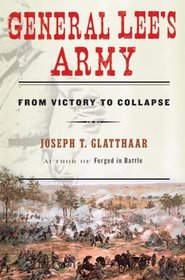My all-time favorite book on the Civil War is James McPherson's "Battle Cry of Freedom." "General's Lee's Army" is now a serious candidate for second place.
While hopefully everyone who reads about the War understands the Confederacy had a problem supplying its armies, and made numerous, stupid, political decisions which made things worse, no one book defines the seriousness of the situation as does this one. Plus, this book finally lays to rest the Southern Mythologist belief most Confederate soldiers did not own slaves or benefit from them.
Not counting the Index or the Bibliography, this book is 542 pages long. Of those, 66 pages comprise citations in small print to support the author's arguments. This book literally took years to complete. It covers every aspect of the war and the Confederacy's support of it, but does not go deeply into battle descriptions. It sounds like a boring book, but it definitely isn't. And if you don't read it, then you'll never understand why the tough Confederate infantrymen lost the war.
Due to the resistance of the Southern planter society, the transportation infrastructure of the Southern states was decades behind that of the North. The South paid for that in blood. When warehouses of food rots 100 miles away from starving soldiers, due to broken down and inefficient railroads, you have to ask why. When thousands of men face winter without shoes or trousers, due to the carelessness of army officers and government bureaucrats, you wonder if the South deserved to win.
When Jefferson Davis toured the South in 1864 giving speeches acknowledging 200,000 Southern deserters---amounting to almost four Confederate armies---and asked them to return to service, you knew he was wasting his time. If his government couldn't support the men still in the ranks, how could it support 200,000 more? The soldiers who stayed worked with worn-out artillery, defective shells, wasted ammunition, horses dying from starvation, no pay, no food, no shelter and so on.
While not mentioned in this book, Elizabeth Van Lew's Union spy ring, based in Richmond, included the man who was in charge of running the railroads in northern Virginia for the Confederacy. So the trains don't get where they are suppose to be. Gee, I wonder why?
It didn't help that General Lee's aggressive strategy help kill off so many of his officers and enlisted men. The men who replaced them were often worse than no replacements at all. Don't believe that? Then I suggest you read "Attack and Die" by Grady McWhiney, first published in 1982. In fact, all you really need to read is its first chapter.
I served in the military as an officer myself. I remember one maxim we were taught, "Amateurs discuss tactics, professionals discuss logistics."
While hopefully everyone who reads about the War understands the Confederacy had a problem supplying its armies, and made numerous, stupid, political decisions which made things worse, no one book defines the seriousness of the situation as does this one. Plus, this book finally lays to rest the Southern Mythologist belief most Confederate soldiers did not own slaves or benefit from them.
Not counting the Index or the Bibliography, this book is 542 pages long. Of those, 66 pages comprise citations in small print to support the author's arguments. This book literally took years to complete. It covers every aspect of the war and the Confederacy's support of it, but does not go deeply into battle descriptions. It sounds like a boring book, but it definitely isn't. And if you don't read it, then you'll never understand why the tough Confederate infantrymen lost the war.
Due to the resistance of the Southern planter society, the transportation infrastructure of the Southern states was decades behind that of the North. The South paid for that in blood. When warehouses of food rots 100 miles away from starving soldiers, due to broken down and inefficient railroads, you have to ask why. When thousands of men face winter without shoes or trousers, due to the carelessness of army officers and government bureaucrats, you wonder if the South deserved to win.
When Jefferson Davis toured the South in 1864 giving speeches acknowledging 200,000 Southern deserters---amounting to almost four Confederate armies---and asked them to return to service, you knew he was wasting his time. If his government couldn't support the men still in the ranks, how could it support 200,000 more? The soldiers who stayed worked with worn-out artillery, defective shells, wasted ammunition, horses dying from starvation, no pay, no food, no shelter and so on.
While not mentioned in this book, Elizabeth Van Lew's Union spy ring, based in Richmond, included the man who was in charge of running the railroads in northern Virginia for the Confederacy. So the trains don't get where they are suppose to be. Gee, I wonder why?
It didn't help that General Lee's aggressive strategy help kill off so many of his officers and enlisted men. The men who replaced them were often worse than no replacements at all. Don't believe that? Then I suggest you read "Attack and Die" by Grady McWhiney, first published in 1982. In fact, all you really need to read is its first chapter.
I served in the military as an officer myself. I remember one maxim we were taught, "Amateurs discuss tactics, professionals discuss logistics."




